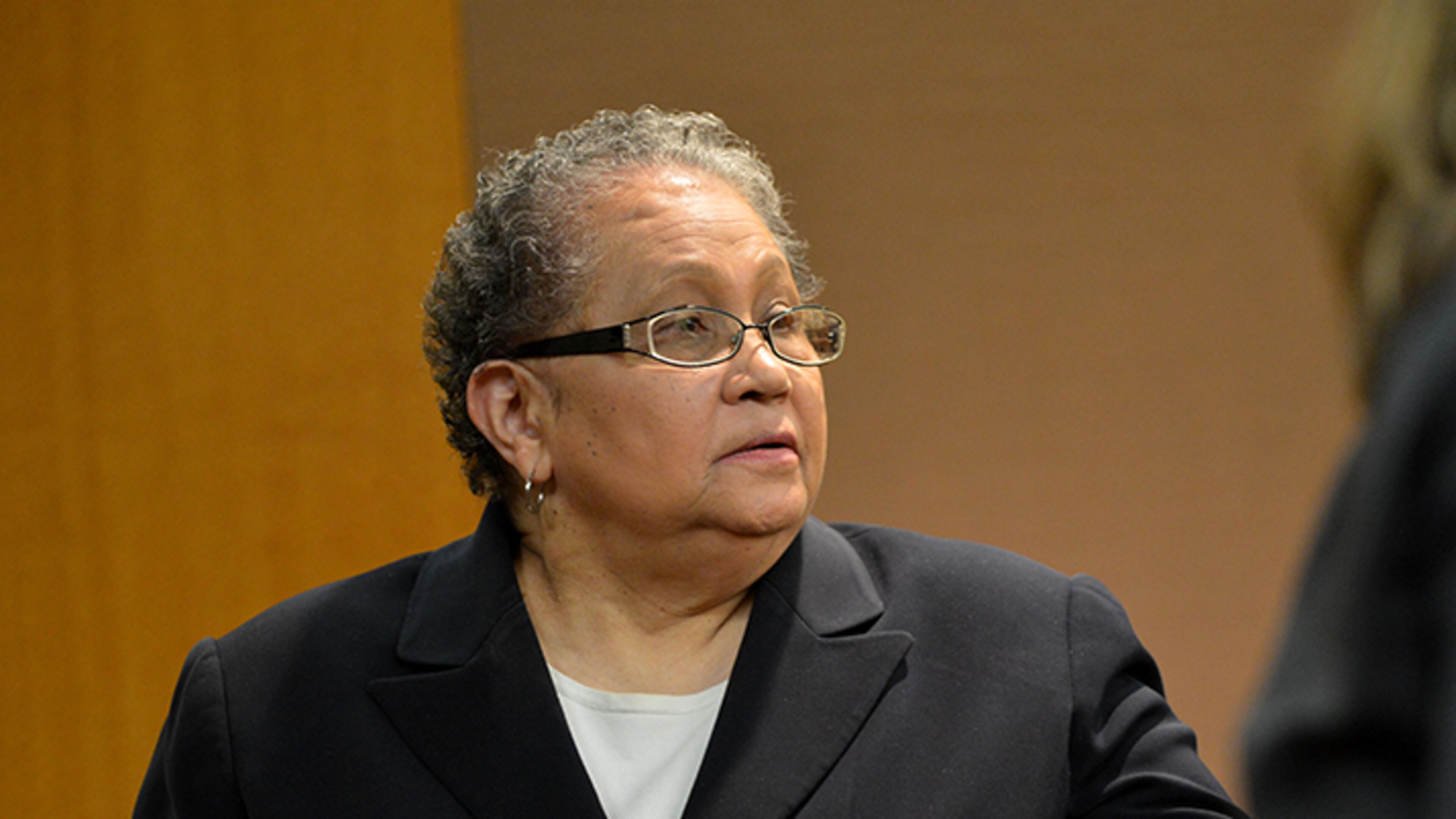APS cheating trial to be held without Hall

What’s next
The trial of 12 former Atlanta Public Schools employees is scheduled to begin Aug. 11. They face charges including racketeering, theft, influencing witnesses and making false statements. The sentence ranges for most of the charges are one to five years in prison, but a conviction on racketeering carries a sentence of five to 20 years.
Remaining APS defendants
Beverly Hall, superintendent
Tamara Cotman, area superintendent
Michael Pitts, area superintendent
Sharon Davis-Williams, area superintendent
Dana Evans, principal of Dobbs Elementary
Tabeeka Jordan, assistant principal of Deerwood Academy
Donald Bullock, testing coordinator at Usher/Collier Heights Elementary
Theresia Copeland, testing coordinator at Benteen Elementary
Diane Buckner-Webb, teacher at Dunbar Elementary
Pamela Cleveland, teacher at Dunbar Elementary
Dessa Curb, teacher at Dobbs Elementary
Shani Robinson, teacher at Dunbar Elementary
Angela Williamson, teacher at Dobbs Elementary
In-depth coverage
The Atlanta Journal-Constitution first investigated improbable improvements on standardized tests in 2008 and then conducted a computer analysis of schools with unusual changes in test scores in 2009.
A state investigation ordered by Gov. Sonny Perdue concluded in July 2011 that 185 APS teachers and administrators participated in cheating on the 2009 Criterion-Referenced Competency Test.
Investigators found suspicious rates of changed answers on standardized tests, and they said in their report that there was evidence of cheating at 44 Atlanta schools. The investigation formed the basis for the criminal charges brought against the educators March 29, 2013.
When the long-awaited Atlanta cheating trial starts next month, prosecutors will have to make their case without the woman they accuse of leading the scheme: former Superintendent Beverly Hall.
The decision to move ahead with a trial against 12 of Hall’s subordinates could harm prosecutors’ effort to show manipulation of standardized test score results, according to several legal experts. Without Hall, they said it will be harder to prove a conspiracy to cheat at 44 schools.
Hall, who is undergoing intense chemotherapy treatment for Stage IV breast cancer, won’t see her day in court unless she recovers enough to be able to assist her lawyers and potentially endure months in court, according to a judge’s ruling Friday.
Fulton County Superior Court Judge Jerry Baxter said he couldn’t delay any longer. He had already pushed the trial back for nearly three months to accommodate Hall’s health, and widespread cheating in Atlanta Public Schools occurred from 2005 to 2009, according to an indictment handed down in March 2013.
“The community is ready to have this decided one way or another,” Baxter said in court. “I don’t think there’s any way that this trial can proceed with Dr. Hall with the condition she’s in.”
Hall, 68, still has criminal charges pending against her based on allegations that she created an environment where teachers had little choice but to cheat. Twenty-one defendants have already pleaded guilty.
During the trial, scheduled to begin Aug. 11, the remaining defendants can claim they were misled or lied to, and Hall’s attorneys won’t be there to call witnesses to contest those accusations, said Richard Waites, a lawyer and psychologist for The Advocates trial consulting firm.
“It’s a significant blow” to the prosecution, Waites said. “The jurors who are sitting in the jury box are going to feel a little bit disillusioned about hearing a case that’s not the main event.”
After months of painting Hall as a “mastermind” behind a long-term effort to fudge test results, prosecutors will be trying to send a group of mostly anonymous educators to prison, said Bob Rubin, an attorney who represents defendant Dana Evans in the case.
“The prosecution’s villain isn’t going to be there to stand trial, and you’re left with a bunch of educators who were slogging through every day to teach kids, and they’re the ones now facing trial. There’s an unfairness there,” Rubin said.
The defendants could use a legal strategy called the “empty chair,” where they blame wrongdoing on someone who isn’t on trial, said Robert Bettler Jr., a consultant for DecisionQuest trial consulting and litigation support firm.
“It could moderate the bad feelings toward the remaining defendants,” Bettler said.
Assistant District Attorney Fani Willis tried to prevent Hall’s part of the case from being separated from the rest of the defendants.
Willis asked the judge to order a psychiatric evaluation of Hall, and suggested that if Hall was well enough to participate in the trial she could attend via an online video service like Skype. Defense attorneys objected to that idea, saying it would infringe on Hall’s constitutional rights.
“We’re in 2014. It’s not 1986 where we don’t have the benefit of all this technology,” Willis said. “The state thinks it’s more prudent to try all the defendants at once.”
Baxter disagreed, saying he didn’t believe Hall was faking her illness, and she wouldn’t be able to participate in the upcoming trial.
Defense attorney Benjamin Davis, who represents Tamara Cotman, a former Atlanta area superintendent, praised Baxter’s decision.
“He did the right thing,” Davis said. “The length of the trial will certainly be shortened” without Hall involved.
The criminal case, which could result in 20-year sentences of defendants found guilty on racketeering charges, followed years of investigations of standardized test scores in Atlanta Public Schools.
The Atlanta Journal-Constitution first reported on suspiciously high results in 2008, and a state erasure analysis of answer sheets found abnormal numbers of changed answers on the 2009 Criterion-Referenced Competency Test.
A state investigation completed in 2011 said that 185 educators, including the defendants, participated in cheating, often by erasing students’ wrong answers and filling in correct answers.
Rewa Berry, the parent of three children in Atlanta Public Schools, said she wants the court process to move forward so the school system can move on.
“It’s time for (Hall) to focus on getting healthy, although I do believe justice needs to be served,” Berry said. “Let’s make sure this never happens again.”



